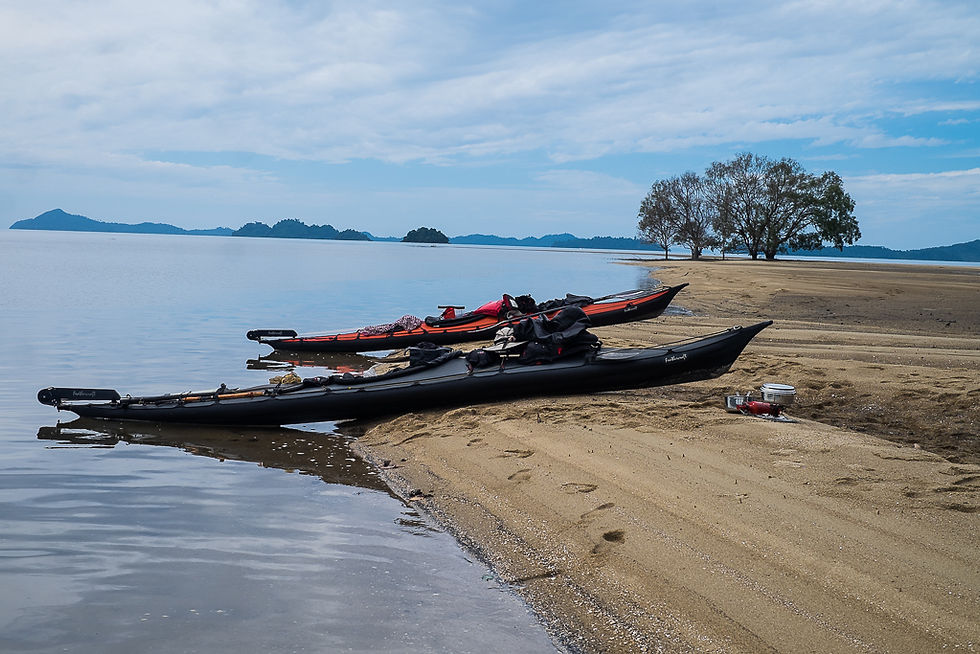Day Tripper: Sea Kayaking Ranong Province on Thailand's North Andaman Coast
- Tim Morch

- Mar 21, 2017
- 3 min read
Updated: Oct 20, 2025
Ranong Province, on Thailand's northern Andaman Coast, is often bypassed by the tourism industry. Although a few islands are becoming more popular, there are plenty that remain below the radar. And miles of untouched coast make exploring the region by sea kayak a unique experience. From the intricate ecosystems of the country's largest mangrove forests and insights into local life, to untouched beaches and islands, this is a region worth discovering.

Rain, Wind, and Floods
The worst storms in over two decades struck southern Thailand in December 2016, and January 2017. As the incessant rain continued day after day, I waited for my paddling partner, Ian Taylor, to arrive, logging over 400km in the north Andaman Sea.
Paddling in rainy, windy conditions is not a problem in the tropics when there's a dry place to return to. But the flooding, unseasonable winds, and downright shitty weather that ravaged the south showed no signs of relenting. There was a decision to be made.
When Ian arrived, we took a couple of soggy day trips buffeted by strong winds and discussed plans for the upcoming adventure. The long term weather forecast showed no signs of change: rain, wind, and more rain.
Setting camp in the rain sucks, and we weren't particularly interested in the prospect of weeks of soggy camping. This led us to a surprisingly rational decision: establish base camp at Green Banana, Aow Lek, Koh Chang, and paddle daily.
Ranong UNESCO Biosphere Reserve
Our focus was the UNESCO Man and Nature Biosphere Reserve south of Ranong town and its 32,000 hectare mangrove forests, canals and fishing communities. We timed forays into the mangrove canals around the tides to allow us to penetrate deep into the reserve.

Mangrove forests are fascinating. There are 74 species of mangroves in Thailand. These amazing plants grow in salt water and form the nursery for diverse fish and wildlife populations. There is an endless potential for exploration.
We enjoyed frequent "shore lunches", featuring Ian's home cooked and dehydrated Chili con Carne in new and fun locations. Sandbars that emerge only at low tide were always fun. We cooked and ate and watched as the tide came in a submerged the lunch spot.

As always, we were welcomed by local fishermen, who became accustomed to seeing us in strange places. From the shrimpers of Sai Dam Island and eel fishers of Khlong Ngao to the crabbers of Jak Island, we were always met with a smile and an invitation to eat.

We divided the days between long paddles in the mangroves and fishing the reefs and rocky shores of Koh Chang and neighbouring Koh Talu. We caught jack trevally, red snapper and barracuda most days and Mama would cook them perfectly. There is something gratifying in catching enough fish to share with friends and family.
One day, Ian tossed the line towards the shore and got a hit immediately. Jack trevally, our most common catch, fight well above their weight. Ian's line started to sing as the fish ran and then went unusually dead. He reeled it in to discover two jacks on the lure.

Perhaps best of all, we knew that no matter what the weather delivered, a dry and friendly home awaited. Our friends and hosts at Green Banana brightened up the soggiest of days. Small and intimate, there is a genuine sense of family and communal living where everyone blends seamlessly.

The food is fantastic. Prepared with love and served with care, Mama's cooking is guaranteed to satisfy. There is nothing like a homemade curry packed with fresh ingredients after a day of paddling.
I've logged thousands of kilometres in the north Andaman, adding nearly 1,000 more this time around. I am becoming more intimate with the nooks and crannies that are abundant on this coastline. There is no better way to discover than from the cockpit of a sea kayak.
To view photos, visit my website: Tim Morch
To watch a video, click here.


Comments